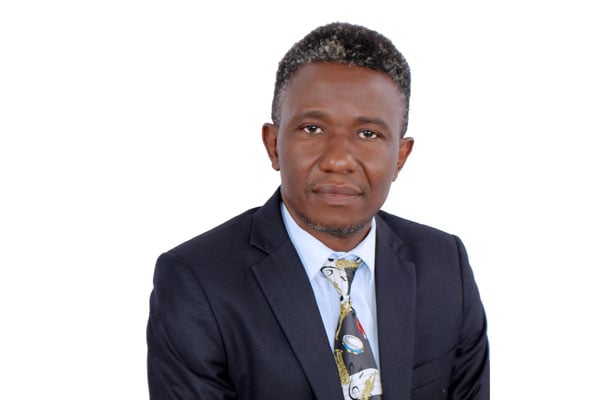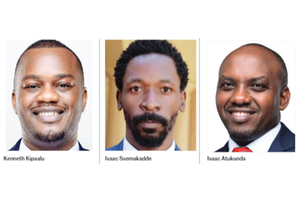
Isaac Kimaze Ssemakadde (left) and Isaac Atukunda (right). Photo/COURTESY
Uganda Law Society (ULS) members head to the polls today with two distinctly different set of choices. On the one hand is Isaac Atukunda largely seen as establishment candidate.
On the other hand is the candidature of Isaac Kimaze Ssemakadde that has spawned colourful terms like stiletto lawyers whilst promising to break ranks with a colonial past in a bid to usher in “a radical new bar.”
Ssemakadde, who christened himself legal rebel and once wore dreadlocks, has—perhaps surprisingly—seen his polarising campaign win the approval of heavyweights in Uganda’s legal sector like Busingye Kabumba, who teaches Constitutional Law at the country’s oldest law school in Makerere.
Ivan Okuda, an advocate, describes today’s poll as “a patriotic call of duty” that offers a choice “between progressive forces who think ULS can do better in defence [and] protection of the Ugandan public [and] rule of law [and] those who want a status quo of a dormant ULS that’s a walking stick for power [and] privilege.
Promises
Ssemakadde is not as civil as Okuda in his description, instead holding out a radical surgery premised on the three Ds of decolonisation, democratisation and demilitarisation. Essentially, banging the table both literally and metaphorically. The normative notions of decorum and civility, he adds, have corrupted the ULS.
Atukunda, who has been secretary of the outgoing ULS administration, intends to build on the work started by Bernard Oundo, the outgoing ULS president.
“Together, we have achieved several milestones. We have completed the first phase of the Ugandan Law Society House. We have registered Uganda Law Society Sacco. We have registered healthcare and benevolent funds. We have organised legal education training and we have offered business growth training,”
Atukunda says, adding that his administration will see to it that the ULS is “more progressive, independent, inclusive, dynamic, and accountable.”
Atukunda’s supporters claim that he is a safe pair of hands that offers much-needed stability and continuity.
“When I think of a person who loves ULS and has demonstrated consistent passion for our deepest values, the experienced and compassionate leader who comes to mind is Isaac Atukunda,” Tony Tumukunde, an advocate, says.
Ssemakadde and his supporters, however, insist Atukunda’s agenda is an echo from a colonial past. ULS, they add, needs to be as bellicose as it was under the presidency of Moses Adriko after the turn of the second millennium. This was after a security Anti-Terrorism Taskforce nicknamed the 'Black Mamba Squad’ stormed the High Court and re-arrested Opposition doyen Dr Kizza Besigye and his co-accused, who had been granted bail after being charged with treason and terrorism offences.
"The whole purpose of our demonstration today was to once again remind the Executive of the Republic of Uganda that it must adhere to the rule of law, respect the independence of the Judiciary, and stop eroding and undermining the Judiciary," Adriko said back then.
Showing a fight
Ssemakadde and his group have cited how the ULS took the battle to court when it challenged the constitutionality of military units besieging the High Court. With the battle lines drawn, the ULS mobilised its top-notch lawyers, including Godfrey Lule, Peter Mulira, David Mpanga and Medard Lubega Sseggona, to challenge the state’s actions. Since it was a constitutional petition a panel of five Justices led by then Deputy Chief Justice Leticia Mukasa-Kikonyongo, Galdino Okello, George Engwau, Constance Byamugisha and Steven Kavuma was constituted.
The panel framed six issues which would guide their judgment: firstly, whether acts of security agents at the premises of the High Court on November 16, 2005 contravened Articles 23 (1) and (6), 28 (1) and 128 (1), (2) and (3) of the Constitution; secondly, whether the concurrent proceedings in the High Court Criminal Case No. 955 of 2005 and the General Court Martial case No. UPDF/Gen/075/05 against the accused contravene Articles 28 (1) and 44 (c) of the Constitution and are inconsistent with Articles 28 (9) and 139(1) of the Constitution; thirdly, whether sections 119 (g) and (h) of the Uganda People's Defence Forces Act of 2005 is inconsistent with Articles 28 (1), 126(1) and 210 of the Constitution; fourthly, whether the joint trial of civilians and members of the Uganda People's Defence Forces in military court for offences under the UPDF Act is inconsistent with Articles 28 (1), 126 (1) and 210 of the Constitution; fifth whether the trial of the accused before the General Court Martial on a charge of terrorism contravenes Articles 22 (1), 28 (1) and 126 (1) of the Constitution, and, lastly, whether the trial of the accused for the offences of terrorism and unlawful possession of firearms before the General Court Martial is inconsistent with Articles 28 (1), 120 (1), (3)(b) and (c), 126 (1) and 210 of the Constitution.
Impactful
The petition by ULS raised several issues that would go ahead to impact Uganda’s jurisprudence for the years to come. What, nevertheless, was key here, among all the issues raised by the ULS, was the independence and impartiality of the Judiciary, which was compromised when the Black Mamba attacked the High Court. Four Justices—Kikonyongo, Okello, Engwau and Byamugisha—ruled that the attack was unconstitutional since “it did not only threaten the independence of the Judiciary and impartiality of courts at the time but continued as a looming danger.”
Justice Okello made clear that the “court is not questioning either the Executive's decision for the presence of those men at that place or their reason for it.” Instead, he added, “it is the effect of the behaviour of those armed men when they were at the High Court premises that we are concerned with.” Per Justice Okello, according to a right-thinking onlooker, the effect of the armed men “taking positions within the High Court premises were intimidating to the judicial officers and all those working in the Judiciary.”
It was only Justice Kavuma, later to become Deputy Chief Justice, who dissented, saying “the deployment of a unit of the UPDF at the said court and the acts undertaken there under were first and foremost for security reasons based on intelligence information available to those responsible for the security of this country, and, secondly, for ensuring the accused did not disappear from the course of justice.”
‘Something went wrong’
With Ssemakadde’s campaign insisting that the ULS should go back to challenging in every possible way, including litigation, his supporters say his unrivalled experience in public interest litigation means he has the requisite skill set to make the body bellicose again.
“In the aftermath of that problematic tweet from the CDF's [Chief of Defence Forces] handle [on X], I saw another shocker—a lawyer stating that the role of the ULS 'is not that of activism.’ All the landmark constitutional cases of the 2000s that we read in law school were instituted by ULS! Something went wrong!” Mark Ruhindi, an advocate, says.
Another point of contention between Ssemakadde and his two opponents is how ULS should relate with the Attorney General (AG) and the Office of the Director of Public Prosecutions (ODPP). Ssemakadde’s opponents in the ULS race have insisted that nothing can be achieved without constructively engaging the two offices. Ssemakadde, however, insists engaging the two offices hasn’t achieved anything in the past and there is a need to challenge them in court if the need arises. He particularly accuses the ODPP of being “a hijacked executive”, adding that this is why they prefer unconstitutional charges such as idle and disorderly on people participating in demonstrations.
No love lost
Ssemakadde, who from the onset wasn’t happy with President Museveni’s move to appoint his lawyer Kiryowa Kiwanuka, as AG, penned an article in The Observer in which he made clear that the appointment was intended to entrench “family rule.” The ULS’s guns will as such be firmly fixed on Kiwanuka if Ssemakadde prevails today.
The so-called legal rebel’s case against the AG has been buttressed by Kiwanuka’s recent claims that there’s a need to amend the Anti-Torture Act. AG Kiwanuka expressed disagreement with the law that allows for the acquittal of suspects if they can prove in court that they were tortured during detention. The AG, who has the support of the ODPP, contended that the focus on torture unfairly denies justice to victims of criminal acts.
“If you are accused of murder and then the court finds that you are acquitted of murder because you were tortured, that’s unconstitutional,” Kiwanuka says.
With cases of torture by state agents on the rise, in 2019, then Principal Judge Yorokamu Bamwine assured the public that judicial officers—starting from the magistrate level—wouldn’t entertain trying tortured suspects.
“I want to give the people of Uganda hope that whenever in any criminal proceeding it appears to a judge or magistrate or it is brought to their attention that the suspect was tortured, the judges will declare the trial a nullity,” Bamwine said, adding: “That person (suspect) will now be free to get an acquittal. This will ensure there will be no derogation of enjoyment of freedom from torture and other human rights.”
Ssemakadde has used AG Kiwanuka’s proposal as an indication that his approach of confronting the powers that be is the best when compared to the approach of his opponents of talking “goody- goody” all the time.
“Those are words of an incompetent charlatan. When he was appointed, I informed the people of Uganda in The Observer that the Attorney General Kiryowa Kiwanuka is the wrong man for the wrong job,” Ssemakadde explains, adding: “There is no decorum in torture. There is no decorum in darkness. Decorum is the mask of oppression.”
PAST ULS PRESIDENTS
Bernard Oundo: 2022-2024
Pheona Nabasa Wall: 2020-2022
Simon Peter Kinobe: 2018-2019
Francis Gimara: 2016-2018
Ruth Ssebatindira: 2013-2016
James Ssebugenyi: 2011-2013
Bruce Kyerere: 2009-2011
Oscar John Kihika: 2007-2009
Deo Nkunzingoma: 2006-2007
Moses Adriko: 2004- 2006
Andrew Kasirye: 2002 – 2004
John Matovu: 2000-2002
Harriet Diana Musoke: 1998-2000
John Mary Byamugisha: 1996-1998
Salome Balungi Bossa: 1994-1996
Remmy Kasule: 1992-1994
Prof Edward Ssempebwa: 1990-1992
Sam Kalega Njuba: 1978-1979
Joseph Mulenga: 1973 -1978
Godfrey Binaisa: 1971-1972
Naphlin Akena Adoko: 1969-1970





